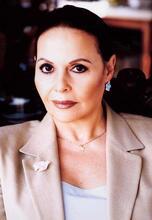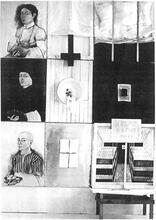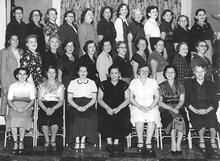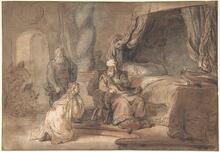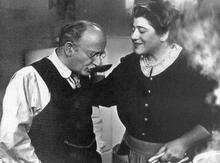Martyred mother with seven sons (4MACC): Apocrypha
Written by a loyalist Jew living in at Antioch in Syria, 4 Maccabees is a retelling of the martyrology of 2 Maccabees in greater philosophical detail. 4 Maccabees praises the mother of the family of seven sons for her devotion to religious reason and her mastery over emotions. The Mother receives a lengthy passage in 4 Maccabees (in contrast to only one verse in 2 Maccabees), lauding her mastery over passion and her faith in God and the promise for eternal life. The mother’s actions encourages her sons to have faith in God, and her story is intended to set the standard for and inspire Jewish mothers.
The Story Told in 4 Maccabees
4 Maccabees, a first-century C.E. work of a loyalist Jew living perhaps at Antioch in Syria, draws upon the martyrology in 1 Macc 6:7–7:42 to construct its portrayal of the martyred mother and her seven sons. While 2 Maccabees is a lengthy and detailed report of the Seleucid persecution of Jerusalem and Judea, its martyrology is less than two chapters. By contrast, 4 Maccabees briefly summarizes 2 Maccabees in a historical preamble (4 Macc 3:20–4:26), with the martyrdoms occupying fourteen chapters (5–18). The aim of 4 Maccabees is to let the martyr stories inspire readers to accept the supremacy of devout reason. 4 Maccabees is in no sense a history of the exploits of the Maccabean leaders; it is a philosophical exercise on the subject of devout reason’s mastery over the emotions or passions (such as anger, envy, jealousy, grief, fear, love). It draws upon the Stoic philosophical tradition, wedding Greek philosophy to Jewish religion.
Praise of the Martyred Family
The author demonstrates the rule of religious reason over the emotions “from the noble bravery of those who died for the sake of virtue” (1:8), specifically Eleazar, the seven brothers, and the mother. His intention is to praise their virtue and call them blessed (1:10). Chaps. 8:1–9:9, an amplification of 2 Macc 7:1–2, set the stage for the seven brothers’ defiance of Antiochus. The young men, “handsome, modest, noble, and accomplished in every way,” come before the king “along with their aged mother” (4 Macc 8:3). Antiochus attempts to persuade the brothers to give up their ancestral traditions and adopt the Greek way of life by threatening them with severe tortures and death and promising them his friendship and benefaction if they will eat the defiling pork (8:12; an act prohibited by Lev 11:7–8). The brothers refuse, “for they were contemptuous of the emotions and sovereign over agonies” (8:28). One by one they undergo hideous torture, described in elaborate gruesome detail. Each endures for the sake of their law and tradition.
As the third is led in, many urge him to taste the meat and save himself, but he shouts, “Do you not know that the same father begot me as well as those who died, and the same mother bore me, and that I was brought up on the same teachings?” (10:2). Here, as in nearly every one of the eighteen Apocryphal/Deuterocanonical Books, Torah she-bi-khetav: Lit. "the written Torah." The Bible; the Pentateuch; Tanakh (the Pentateuch, Prophets and Hagiographia)Torah observance and instruction are important. Other women with roles in teaching Torah include Susanna’s mother (Sus v. 3) and Tobit’s grandmother, Deborah (Tob 1:8).
The Mother’s Bravery
As in 2 Macc 7:25 the mother is summoned by the king to her youngest, seventh son, before he is tortured. But in 4 Macc 12:1–19 the king is supposedly showing compassion for this mother who had been bereaved of so many sons (12:6). After the mother exhorts her youngest, in Hebrew, he runs to the braziers and gives a long speech that sums up the themes found in the other brothers’ speeches, emphasizing that injustice and savagery will result in the king’s eternal punishment (12:11–18), then he flings himself into the braziers and so ends his life (12:19).
Following a section praising the seven brothers’ courage, piety, and endurance for the sake of religion (13:1–14:10), the death of the mother—told in one verse in 2 Macc 7:41—artfully climaxes the oration (4 Macc 14:11–17:6). Written as a lengthy encomium, a tribute, the mother’s martyrdom emphasizes her terrible torments and her mastery of her passions. “Sympathy for her children did not sway the mother of the young men; she was of the same mind as Abraham” (14:20). Intended as a high compliment, this verse raises serious problems for some contemporary readers. The stoic superiority of reason and its triumph over emotions is troubling, as is the exclusive association of reason with men and emotion with women. This “daughter of God-fearing Abraham” (15:28; compare 18:20) and mother of seven “sons of Abraham” (18:23) displays mastery over love of offspring and physical life. The promise of eternal life (15:3), not an angel’s word (as in Gen 22:12), is the reward of her faith (4 Macc 15:24).
According to the book’s logic, Antiochus violated physical bodies, but he could not touch the true life of the community or, in the end, this woman. By throwing herself into the flames (17:1), the mother’s suicide prevents her being touched by a Gentile, and allows her to die with no violation of her chastity.
Virtue and Sacrifice in 4 Maccabees
The most significant theological contribution of 4 Maccabees is its development of the idea that the suffering and death of the martyred righteous is an atoning sacrifice with redemptive efficacy for all Israel (17:20–22). This is particularly true of the mother’s actions, which earn for her the very highest praise.
The mother’s displaced last words to her sons (18:6–19; the seventh son died in 12:19) make of her—even in death (she died in 17:1)—the final spokeswoman for the supremacy of the Jewish religion and family values. She taught her sons through her example as a good wife while their father was alive (his death is mentioned in 4 Macc 18:9; he is absent in 2 Maccabees). She tells her sons that their father taught them the law, read to them about various male biblical figures, sang them songs, and saw to their proper education (see 18:10–19).
Virtue superseded love for family and life itself. Emotions were shared in common, but mothers “because of their birth pangs have a deeper sympathy toward their offspring than do the fathers” (15:4). Women, “the weaker sex,” are by nature “more devoted to their children” (15:5). Affection and piety come together in the portrayal of this noble mother. Rational fear of God allows her to overcome her natural love of her children and encourage her sons’ deaths. Their martyrdoms, and hers, attained incorruption in eternal life for their family and all Israel.
The Mother’s Legacy
In the end, earthly life means little in the light of life eternal. Temporal kingship means nothing when contrasted with God’s eternal kingship. The passions of a mother are overshadowed by courage and “rational” behavior—if encouraging seven sons to die is so judged. For the author, she is the “mother of the nation, vindicator of the law, and champion of religion” (15:29). She is “more noble than males in steadfastness, and more courageous than men in endurance!” (15:30). This “guardian of the law,” though flooded by emotion, withstood like “Noah’s ark, carrying the world in the universal flood” (15:31–32). Later traditions accord the anonymous mother various names: Miriam bat Tanhum, Shamone, Maryam, and Hannah.
Anderson, Hugh.“ 4 Maccabees (First Century a.d.).” In The Old Testament Pseudepigrapha, edited by James H. Charlesworth, 2:531–564. Garden City, New York: 1985.
Meyers, Carol, General Editor. Women in Scripture. New York: 2000.
Young, Robin Darling. “4 Maccabees.” Women’s Bible Commentary, edited by Carol A. Newsom and Sharon H. Ringe, 330–334. Kentucky: 1998.
Ibid. “The ‘Woman with the Soul of Abraham’: Traditions about the Mother of the Maccabean Martyrs.” In “Women Like This”: New Perspectives on Jewish Women in the Greco-Roman World, edited by Amy-Jill Levine, 67–81. Atlanta: 1991.


